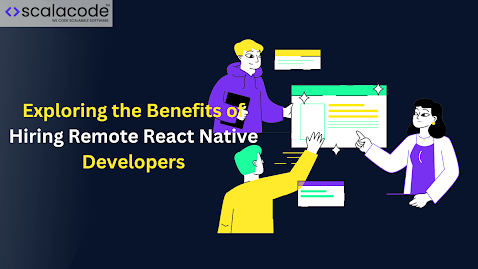Why Node.js is the Perfect Choice for Hiring Developers
In today's competitive tech industry, finding the best Node.js developers is crucial for the success of your projects. Node.js has gained popularity for its ability to build scalable and efficient web applications.
However, hiring the right talent can be a challenging task. This guide aims to provide you with a step-by-step approach to finding and hiring the best Node.js developers for your team.
Understanding Your Requirements
Understanding your requirements is the foundation of successful project execution. This involves in-depth discussions to grasp your goals, functionalities needed, design preferences, and technical specifications. Clear communication ensures alignment between your vision and the development process, enabling the creation of a tailored solution that meets your specific needs and expectations.
Accurate Solution: Clear understanding of requirements ensures that the final product or solution effectively addresses the specific needs and objectives.
Minimized Errors: Thorough comprehension of requirements reduces the risk of misunderstandings and errors during development or implementation.
Efficient Planning: Understanding requirements aids in creating well-defined project plans, allocating resources, and setting realistic timelines.
Client Satisfaction: Meeting and exceeding requirements leads to higher client satisfaction, as the delivered solution aligns closely with their expectations.
Cost-Effective: Properly understanding requirements prevent costly rework, changes, or modifications later in the project lifecycle.
Sourcing Node.js Developers
Sourcing Node.js Developers involves targeted strategies. Begin by defining the skills and experience needed. Utilize online platforms, job boards, and social media to post openings. Screen resumes and portfolios to shortlist candidates. Conduct technical interviews to assess proficiency. Evaluate communication and teamwork skills. Choose developers aligned with your project scope and company culture for a successful collaboration.
Online Platforms: Utilize online job platforms, freelancing websites, and developer communities to post job listings and connect with Node.js developers.
Tech Events and Meetups: Attend tech conferences, seminars, and local meetups to network with developers and discover potential candidates.
Recruitment Agencies: Collaborate with recruitment agencies specializing in IT and software development to find qualified Node.js developers.
Developer Portfolios: Review online portfolios, GitHub repositories, and coding profiles to assess the skills and expertise of potential Node.js developers.
Referrals: Tap into your professional network to seek referrals from colleagues, peers, or industry connections who might know suitable Node.js developers.
Evaluating Candidates
Evaluating candidates is a critical hiring step. Review resumes to match skills with job requirements. Conduct initial interviews to assess technical expertise, problem-solving, and cultural fit. Utilize technical assessments or coding tests to gauge coding skills. Consider communication, adaptability, and experiences. Reference checks validate qualifications. A holistic evaluation ensures the selection of candidates who align with your team and project goals.
Skills Assessment: Use technical tests, coding challenges, or skill-based assignments to assess candidates' practical abilities related to the role.
Behavioral Interviews: Conduct interviews focusing on candidates' experiences, problem-solving approaches, and teamwork dynamics to gauge their fit for the role and company culture.
Cultural Fit: Evaluate how well candidates align with the company's values, mission, and team dynamics to ensure a harmonious workplace environment.
Reference Checks: Contact provided references to gain insights into candidates' work ethic, skills, and overall performance from previous employers or colleagues.
Panel Interviews: Include multiple interviewers from different departments or roles to provide diverse perspectives and gather a more comprehensive evaluation of the candidate.
Conducting Interviews
Conducting interviews requires a structured approach. Prepare a proper list of technical as well as behavioral questions. Begin with introductions and a brief overview of the interview process. Evaluate technical skills, problem-solving, and coding abilities. Assess communication, teamwork, and cultural fit. Allow time for candidate questions. After the interview, gather feedback and compare candidates to make informed hiring decisions.
Structured Questions: Prepare a set of consistent, structured interview questions that focus on the skills, experiences, and traits relevant to the role.
Active Listening: Pay close attention to candidates' responses, allowing them to fully express themselves while picking up on nuances and details.
Behavioral Examples: Ask candidates to provide specific examples from their past experiences to showcase how they've handled challenges and situations related to the role.
Probing and Follow-up: Ask follow-up questions to delve deeper into candidates' responses, gaining a more comprehensive understanding of their thought processes and decision-making.
Candidate Engagement: Create a welcoming and comfortable atmosphere, encouraging candidates to ask questions and fostering a positive interaction that reflects the company's culture.
Making the Final Decision
Making the final decision involves careful consideration. Review interview performance, technical assessments, and cultural alignment. Compare candidates against predefined criteria. Evaluate their experience, skills, and potential contributions to the team. Consult team members if needed. Trust your instincts while weighing objective data. Ultimately, choose the candidate who best fits the role, team dynamics, and long-term objectives.
Evaluation Criteria: Review how well candidates align with the established job requirements, skills, and cultural fit criteria.
Comparison: Compare candidates' strengths, weaknesses, and interview performance to identify the best fit for the role.
Team Input: Gather input from other team members who interacted with the candidates during the interview process to gain additional perspectives.
Reference Validation: Ensure the information gathered from reference checks confirms the candidate's qualifications and suitability for the role.
Consideration of Growth: Assess candidates not only for their current capabilities, but also for their potential to grow and contribute to the company's future success.
Conclusion
By following this guide, you will be equipped with the knowledge and strategies to find and hire the best Node.js developers for your team. Remember to thoroughly assess candidates' technical skills, evaluate their portfolios, and consider their cultural fit to make an informed decision. Hiring the right talent will not only ensure the success of your Node.js projects but also contribute to the growth and success of your organization.



Comments